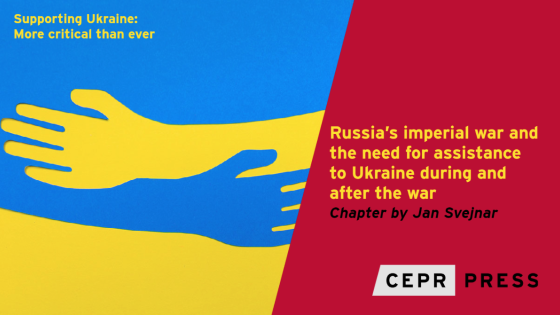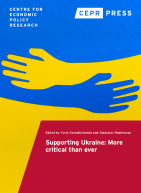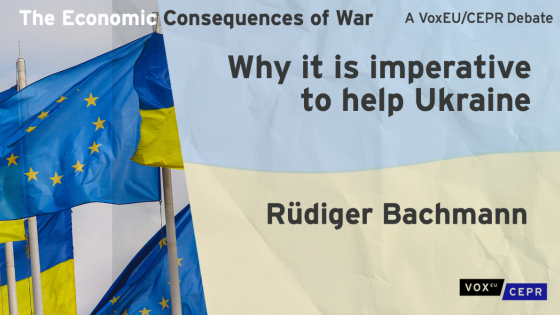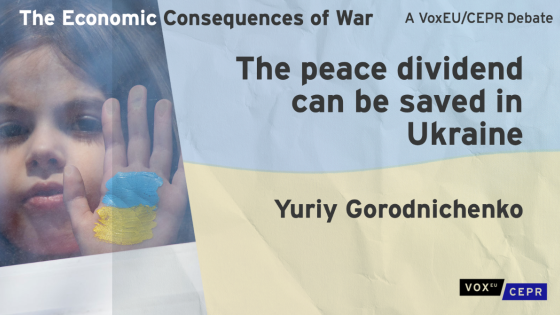The situation one year into the war
The Ukraine war is different from Soviet Union’s and Russia’s other invasions since WWII in that Ukraine’s territory is large and the Ukrainian leadership and people have demonstrated an unprecedented willingness to fight the invading army. The losses in human lives and physical destruction have been enormous, but the country resolutely perseveres in its struggle.
Given Putin’s threat and ambitions, and the resolute Ukrainian response, the reaction of the West has been strong, albeit slow and not fully coordinated. Western sanctions imposed since the invasion of Ukraine have been more all-encompassing than those imposed after the invasion of Crimea in 2014 and they have been escalating over time. The supply of war material has been substantial and gradually shifting from the provision of lighter weapons and accessories to heavier artillery, tanks and fighter jets. The effect of sanctions has been limited, however, as Russia’s economy declined only slightly in 2022. The inability of Europe to immediately cut off Russia’s supplies of oil and gas and Russia’s ability to sell oil and gas to other countries, especially China and India, helped to stave off a major decline of Russia’s economy. So did the surprising fact that most Western firms remained in Russia and continued to pay the Russian government sales and excise taxes despite the sanctions. The Western economic response has hence been fragmented and overall inadequate in achieving its goal of greatly weakening Russia’s economy.
It must be noted that in all this the excellent public relations and lobbying campaign of President Volodymyr Zelenskyy and other Ukrainian officials has played a major part in generating Western support.
The role of Central and Eastern European countries
While on the large scale it was the US that reacted most quickly and provided the most substantial military support after the start of the war, regionally it was the countries of Central and Eastern Europe (CEE) that reacted most quickly, provided the largest per capita assistance, and stimulated the Europe-wide response. As Russia’s invasion took place, the leaders of the Czech Republic, Poland and Slovenia almost immediately travelled to Kyiv to meet with Ukraine’s leaders and express their support to Ukraine. The CEE countries were also the first to provide military and civilian assistance, and they welcomed and effectively absorbed a major inflow of refugees, primarily mothers and children as many men joined the Ukrainian army. By the end of 2022, the number of Ukrainians refugees per 1,000 inhabitants had reached 46.4 in the Czech Republic, 41.4 in Poland, and 19.9 in Slovakia. The corresponding numbers were also relatively large for Germany (12.7), Austria (10.4) and Switzerland (9.1) but, except for Ireland (14.5), they were much smaller elsewhere (Protivinsky and Munich 2023).
Military and non-military support for Ukraine from the NATO countries has been growing over time, as has been the sophistication of the weapons provided. This, in addition to a surprisingly ill-prepared Russian army, has enabled the Ukrainian army to carry out a successful offensive and so far also to resist a counteroffensive by Russia. The challenge for the West going forward is to deliver the necessary military support permitting Ukraine to succeed militarily. The political will enabling this hinges in turn on maintaining popular support in the West for Ukraine and the acceptance of refugees. Studies indicate that the strong popular support is moderating over time. For instance, an in-depth analysis of the situation in the Czech Republic, where the support still remains very high, identifies as principal causes of the declining support the withering away of the initial shock of the war and a gradual fatigue with accepting additional refugees (Protivinsky and Munich 2023). This is to be expected, but it can be offset by other measures that could be taken by the West. The CEE countries have been calling on NATO to provide security guarantees to postwar Ukraine and for the European Union to initiate the process for EU membership. These and other steps would clearly boost the morale of the Ukrainian troops and provide for a postwar transition.
Reconstruction during and after the war
As this discussion indicates, major military support for Ukraine is needed if the country is to protect itself from the aerial and surface attacks, and eventually repel Russia’s aggression. The destruction of civilian targets, including hospitals and schools, is dramatic and Western assistance in the ongoing reconstruction of these sites is valuable, but needs to be stepped up.
The big question is naturally the postwar reconstruction of Ukraine. Estimates of costs exist, blueprints of strategies have been drafted (Gorodnichenko et al. 2022,) and preparations are to some extent underway. The estimated costs are high and growing, but lessons from the post-WWII reconstruction of Europe and Japan are instructive. At the local level, the reconstruction of extensively destroyed cities, such as Hamburg or Hiroshima, turned out to be much faster than expected because of the presence of human capital (Ehrenberg et al. 2021). The important lesson is that reconstruction can be relatively rapid in the presence of destroyed physical capital if human (and financial) capital is present.
What strategy is needed for the economic reconstruction and advancement of Ukraine as a whole? In 1990, after the fall of the Berlin Wall, I had a discussion with Thomas Schelling about the success of the post-WWII Marshall plan for Europe in the preparation of which he participated. His main point was that while the US financial aid was important, by far the more important economic aspect turned out to be the US insistence that the European countries set aside war-time animosities and start trading with each other. If Schelling is right, and I think he is, then it is imperative that Europe establish free access for Ukraine’s products to its markets.
On the domestic front, it is obviously crucial for Ukraine to establish an effectively functioning governance system with an emphasis on stamping out corruption.
Concluding remarks
Ukraine is in a dire situation, given Putin’s ruthless pursuit of imperial expansion. However, Ukraine’s heroism and capable leadership, Russia’s surprisingly inadequate military capabilities, and Western support provide hope for Ukraine’s effective defence and postwar reconstruction. A dangerous development would be if China, which has so far only increased its trade in non-military products with Russia, were to start supplying Russia with arms. The Western world is increasingly recognising that the battle over Ukraine is very important per se, but that it also represents a larger struggle over the global rules and governance of the world.
References
Gorodnichenko, Y, I Sologoub, and S Weder di Mauro (eds) (2022), Rebuilding Ukraine: Principles and Policies, CEPR Press.
Ehrenberg, R G, R Smith, and K F Hallock (2021), Modern Labor Economics: Theory and Public Policy, 14th Edition, Taylor & Francis.
Protivinsky, T and D Munich (2023), “Vyvoj postoju ceske verejnosti k valecnym uprchlikum z Ukrajiny,” IDEA Study, CERGE-EI.



